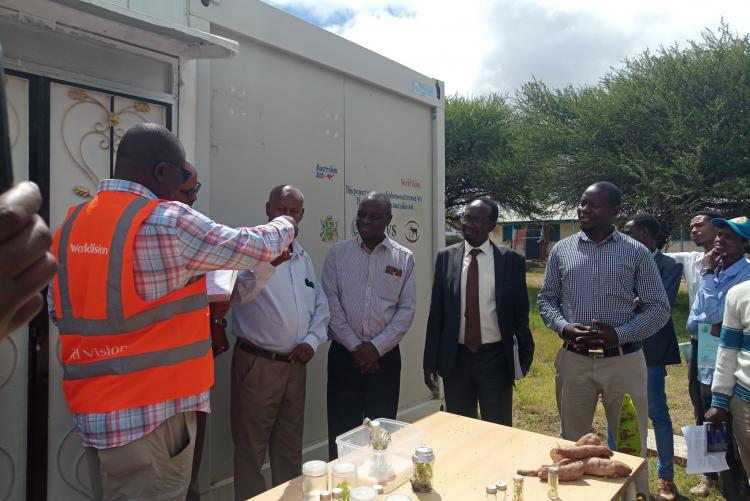Handover of the tissue culture lab to IGAD Sheikh Technical Veterinary School (ISTVS)
The increasing need to sustainably manage Frankincense trees in Somaliland led to a collaborative research between World vision Somalia, the University of Nairobi and IGAD Sheikh Technical Veterinary School (ISTVS). This partnership seeks to develop and implement propagation of frankincense through tissue culture technology. The initial plan started with the process being curried out at the University of Nairobi tissue culture laboratory in the initial phase. This aimed at identifying culture media that provide positive regenerative response of plant tissues from various plant parts collected and development of the propagation protocol. This is a critical initial stage in tissue culture work that if successfully achieved, the subsequent multiplication becomes fast and safe. However, when this process was initiated, several challenges were experienced; during the transfer of the tissue culture materials from Somaliland to the lab hindered the attainment of optimum conditions for culturing. This is because; the collected plant materials were from mature tree and were hard and the time taken to transfer for culturing was long hence did not show induction due to the old meristematic regeneration tissue of the old parts, we lacked subsequent parent plant materials close to UoN labs for subsequent culturing to minimizing contamination, also, the plant materials/explants reached the lab after long periods in the cool box during transit hence reduced optimal regeneration.
The project team had to address these challenges and make the propagation successful and sustainable. This led to establishment of a tissue culture lab at ISTVS in the second phase of the project supported by ANCP project. This was necessary to ensure the propagation process is localized and also to provide the opportunity of the technology domestication and to build the capacity of the local communities to use the lab in addressing the many challenges facing natural resource management in the country. The lab has been established and fully equipped at ISTVS, awaiting commissioning and operationalization in the month of November 2019.
Frankincense propagation progress
The University of Nairobi research team has been working on this component and is at an advanced stage. The tissue culture process is a continuous activity until results are realized. The first step was to identify a media that works for frankincense trees in initiating cells regeneration. This activity was done at the University of Nairobi, tissue culture laboratory using the samples collected during the field visit in Burao. The process has shown positive progress with the identification of media that the tree responded and showed tissue regeneration. A working media has been identified, plants parts that are promising for tissue culture propagation have also been identified, shooting has been attained but rooting is what is being worked on at the present to finalize on the protocols. The modern tissue culture laboratory set up in Somaliland at ISTVs will reduce the need for transfer of frankincense tree explants for long distances that exposes the tissue to contamination and death. This will help in Tissue culture work in Somaliland for many important crops and trees for the benefit of the community. The lab will also be used for training of students at ISTVS in the technology for capacity development in the region. This will address the many challenges in propagation of important trees besides frankincense in Somaliland.
The project has also successfully explored vegetative propagation of the tree species with seedlings establishment at ISTVS. This is a positive progress with the project having identified the procedures and rooting hormones and trained the communities from the growing areas on vegetative propagation of the species.
Handover of the tissue culture lab to ISTVS
The handover of the tissue culture lab will be of great importance to the institution and the country in terms of capacity development and technology application in solving the community challenges. ISTVs will be at the central of contribution to solving the countries propagation challenges through the application TC technology. The school will contribute to capacity development for the future biotechnologists and agriculturalists for Somaliland, by receiving hands on training, the graduates will apply the tissue culture technology in addressing the low productivity of crops and trees in the country. The handover of the lab and the linkage with the communities should provide public good in terms of products development and application of tissue culture technology in solving the communities’ needs in food production and provide solution for climate change adaptation through better plants/crops.
Benefits of the Established Tissue Culture lab to Somaliland
The established TC lab is the only tissue culture lab in the country that will serve both the community and learners in the field of agriculture and environmental conservation. The established lab will bring tissue culture technology to the country for both crops and tree propagation. This will increase propagation efforts to enable community/farmers access clean and quality seedlings of fruit trees, important forage trees and other commercial trees like Frankincense for better livelihoods. The efforts will also help address the environmental challenges resulting from degradation and lack of trees for re-afforestation due to loss of gene bank and the natural low seed regeneration by many important trees. Tissue culture technology will allow users have mass production and reduce the juvenility of plants hence fast growth and higher productivity compared to conventional propagation methods. The country will also benefit from the local capacity development in tissue culture technology and hence enhanced sustainability of the technology application in solving the communities’ challenges.
- Log in to post comments

